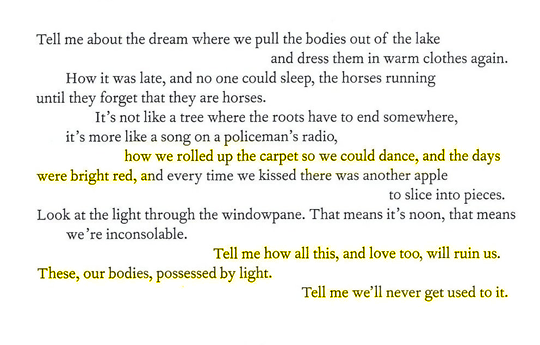
But this is what the book does: it explores destructive relationships, the voice throughout begging for a place where it can just be safe and loved, but it never finds it.

Why do certain pieces of literature become necessary to us? And how far will we commit ourselves to them? It’s hard to imagine another contemporary collection of poetry that stares at its readers and says, You can never be rid of me. You weren’t supposed to.” Siken drives his lines like a stake into us, a hypnosis. This is especially evident in the poem “Straw House, Straw Dog,” where Siken uses anaphora as a stand in for obsession: “You can sleep now, you said. It isn’t over yet, it’s just begun.” In her judge’s citation, Louise Gluck describes the collection as “panic.” It’s Siken’s use of repetition that corners the reader, a dizziness surfaces you’re moving but not going anywhere. It’s not up to you to decide when you’ve had enough: “So you get a kidney punch, a little blood in your urine. The form is such that it won’t let you stop until it’s finished with you. The experience of reading CRUSH is exhilarating. The poems are no longer Siken’s but some “other’s.” Where did they come from? What do we do with them? It’s not an overstatement to say this is the most important book some people will read, and they’d tell you this to your face, rolling up their sleeve to reveal a CRUSH line tattooed on their arm: “Tell me we’ll never get used to it.” With a cult-like following, CRUSH has been transcended we take it in like a drug that fully dissolves but won’t leave the body. He said he’d avoid meeting Siken just to “protect” the way he views the book. In discussing CRUSH recently with a friend, we realized we both place this book on a pedestal and don’t want anything to “ruin” it. Its readers are like devout patriots to an under siege country. The book feels like it could save your life, and so you’d die for it, too. There is an emphatic dedication to CRUSH by his readers (myself included), as though it’s a prophet to the fringe, the addicted, the self-destructive. Regardless of this story’s validity, Siken’s collection CRUSH, selected for the 2004 Yale Series of Younger Poets prize, is tinged with this seediness his book is the celebrity, not him. Her boyfriend told Siken, but what was he supposed to do with that? The same sort of guilt by association placed on Marilyn Manson after Columbine.

It’s rumored a woman used Richard Siken’s poem “Scheherazade” as her suicide note. One of those: CRUSH by Richard Siken, a collection of poems about obsession and love.

As we continue stocking the shelves during our soft opening, more and more of the titles we love are arriving in the store.


 0 kommentar(er)
0 kommentar(er)
